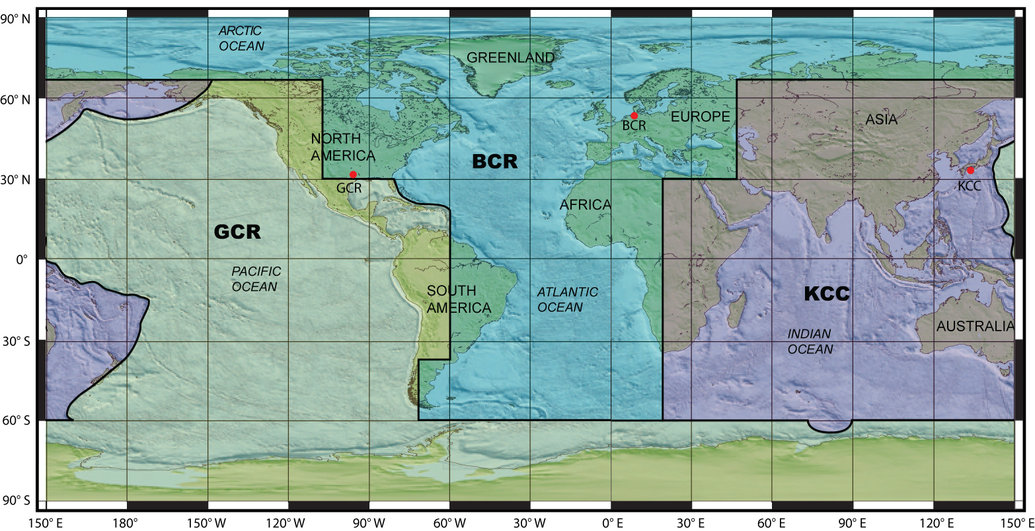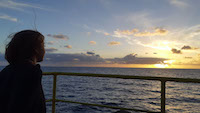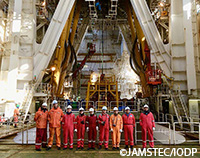Data Access
Data from IODP expeditions can be accessed via the expedition's Science Operator:
Sample Access
Physical samples are archived at three repositories. Sample requests for all DSDP, ODP, and IODP cores are submitted using the Sample and Data Requests Database (SaDR). By receiving samples, researchers implicitly agree to comply with the IODP Sample, Data, and Obligations Policy. A Curatorial Advisory Board makes final decisisons regarding distribution of IODP samples.
SEDIS
The integrated data and publications portal Scientific Earth Drilling Information System (SEDIS) initiated during the Integrated Ocean Drilling Program 2003-2013 continues into the International Ocean Discovery Program and is now funded by ECORD and supported by MARUM. SEDIS allows search across source databases and aggregation of data sets from:
- Post-moratorium data and metadata from all IODP and legacy program data systems (e.g., JANUS, LIMS, J-CORES, WDC-MARE/PANGAEA, Logging Database SSDB, etc.)
- Publications and publications metadata from IODP/ODP/DSDP and the open literature related to scientific ocean drilling
- Post-expedition data and metadata from post-cruise data capture projects and voluntarily submitted post-expedition data sets
Site Survey Data Bank
The Site Survey Data Bank (SSDB) is a repository for digital site survey data submitted in support of IODP proposals, expeditions and related activities. Many files are freely available, but proprietary holds requested by proponents are strictly maintained. The SSDB also contains older site survey data for some ODP proposals and legs. Analog site survey data (e.g., paper plots) submitted in support of IODP, ODP and DSDP proposals and expeditions/legs are stored on site at the SSDB.
Micropaleontological Reference Centers
Maintained by curators at over a dozen sites around the world, the Micropaleontological Reference Centers (MRCs) provide scientists with an opportunity to examine microfossils of various geologic ages and from a globally distributed set of locations. The collections, with more than 20,000 samples, cover four microfossil groups—calcareous nannofossils, foraminifers, radiolarians, and diatoms—selected from sediment cores obtained from the scientific ocean drilling programs. The MRCs are a source of materials for current research and a legacy archive.
Microbiology Sample Material Availability
Subseafloor microbiological samples from some IODP expeditions are available for request.
IODP cores - physical samples drilled from the seafloor - are stored and curated at core repositories funded by the platform providers. Cores are assigned to specific repositories based on their ocean of origin as shown below. After the expedition moratorium period, core samples may be requested for scientific research. A Curatorial Advisory Board makes final decisions regarding distribution of IODP samples.
| For more information on the repositories, contact the curator. Bremen Core Repository – This email address is being protected from spambots. You need JavaScript enabled to view it. Gulf Coast Repository – This email address is being protected from spambots. You need JavaScript enabled to view it. Rutgers/NJGS Repository – This email address is being protected from spambots. You need JavaScript enabled to view it. Kochi Core Center – This email address is being protected from spambots. You need JavaScript enabled to view it. |
Geographic Assignment of Core Samples to Repositories
| Repository | Institution | Amount of Core | Program(s) Generating Core | Geographic Location |
| GCR | Texas A&M University | 152 km | DSDP, ODP, and IODP | Pacific (Pacific plate east of western boundary); Caribbean Sea and Gulf of Mexico; Southern Oceans (S of 60º except Kerguelan Plateau) |
| BCR | University of Bremen | 192 km | DSDP, ODP, and IODP | Atlantic and Arctic Oceans (north of Bering Strait); Mediterranean, Black, and Baltic Seas |
| KCC | Kochi University / JAMSTEC | 149 km | DSDP, ODP, and IODP | Pacific (west of western boundary of Pacific plate); Indian Ocean (N of 60ºS), all of Kerguelan Plateau, and the Bering Sea |
| Rutgers/NJGS | Rutgers / NJGS | 4.1 km | ODP Leg 150X & 174AX | Land-based New Jersey and Delaware cores |
DSDP: Deep Sea Drilling Program ODP: Ocean Drilling Program IODP: Integrated Ocean Drilling Program / International Ocean Discovery Program

U. Röhl adapted from Firth, JV, Gupta, LP and Röhl, U (2009) New focus on the Tales of the Earth - Legacy Cores Redistribution Project Completed. Scientific Drilling, 7. 31-33. doi:10.2204/iodp.sd.7.03.2009. [Map Mar 15, 2016]. Retrieved from http://www.marum.de/en/Cores_at_BCR.html
Project Mohole
 Samples from Project Mohole are stored in the Geological Collections at the Scripps Institution of Oceanography at the University of California, San Diego. The collections include about 40 meters of core, as well as ship logs. The Smithsonian’s National Museum of Natural History has some basaltic samples from Project Mohole. For more information about accessing Project Mohole samples, contact the respective repositories.
Samples from Project Mohole are stored in the Geological Collections at the Scripps Institution of Oceanography at the University of California, San Diego. The collections include about 40 meters of core, as well as ship logs. The Smithsonian’s National Museum of Natural History has some basaltic samples from Project Mohole. For more information about accessing Project Mohole samples, contact the respective repositories.
Page 2 of 2



